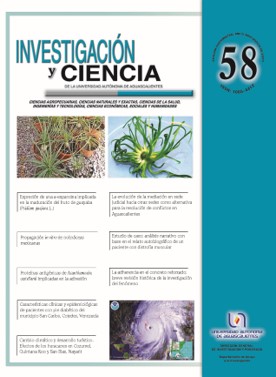Case study: Narrative analysis about the autobiographical story of a muscular dystrophy patient
DOI:
https://doi.org/10.33064/iycuaa2013584004Keywords:
Autobiographical story, Duchenne’s muscular dystrophy, narrative analysis, identity, transcendence, new meaning of lifeAbstract
The case study showed in this article, presents the narrative analysis about the autobiographical story of a patient diagnosed with Duchenne’s Muscular Dystrophy who attends the Centro de Rehabilitación Infantil Teletón Aguascalientes. The objective was to analyze his story identifying elements about his immediate environment that affect his identity construction. The investigation
design was qualitative, clinical, and prospective, with narrative analysis of 38 depth interviews. The patient’s speech indicates widespread difficulty to elaborate a structured idea about his identity, presents victimization, little differentiation of the family, difficulty to identify and express emotions, ambivalence, poor disability acceptance, world’s negative vision, and need for socialization. The study is useful to trace therapeutic management, such as: new meaning of life and transcendence.
Downloads
References
• BOWEN, M., De la familia al Individuo. La diferenciación del sí mismo en el sistema familiar. Argentina: Paidós, pp.9-10, 41 y 102-107, 1998.
• BRIEUX, O. C., Identidad: Misterio y tarea de ser uno mismo. Argentina: Lumiére, pp.166-169, 2000.
• GIAMPIERO, A., Estudios y diálogos sobre identidad personal: Reflexiones sobre la experiencia humana. Argentina: Amorrortu, pp. 40-41, 44-45 y 63, 2003.
• GONÇALVES, O. F., Psicoterapia cognitiva narrativa: Manual de Terapia Breve. España: Desclée de Brouwer, pp. 18-20, 27, 35-36 y 46-48, 2002.
• MICHELI, F., NOGUÉS, M., ASCONAPÉ, J., PARDAL, F., BILLER, J., Tratado de Neurología Clínica. Argentina: Panamericana, pp. 1233-1237, 2002.
• MINUCHIN, S., Familias y terapia familiar. Barcelona, España: Gedisa, pp. 23-33, 87 y153-156, 1995.
• MINUCHIN, S., FISHMAN, H., Técnicas de terapia familiar. España: Paidós, pp. 153-157, 2005.
• PAYNE, M., Terapia Narrativa: Una introducción para profesionales. España: Paidós, pp. 32-36, 2000.
• ROLLAND, J. S., Familias, enfermedad y discapacidad: Una propuesta desde la terapia sistémica. España: Gedisa, pp. 101,142, 219-220, 242, 2000.
• SHARP M., DOHME, Manual Merck. España: Océano, pp. 754-756, 2012.Dictiotipografía
• CANEIRO, G., ESPINO, O., GODOY, P., Rehabilitación del paciente agudo con Enfermedad de Duchenne.
Presentación de un Caso. Revista Cubana de Medicina Física y Rehabilitación, 2(1). De: http://bvs.sld.cu/revistas/mfr/vol_2_1_10/mrf08210.htm, 23 nov. 2011.
• DE VILLERS, G., La historia de vida como método clínico, Proposiciones 29 marzo*. *Artículo originalmente publicado: J. M. Baudouin y Ch. Josso, (Eds.), “Penser la formation. Contributionsépistémologiques de l’Education des Adultes”, Cahiers de Pratiques et Théorie, Cahier Nº 72 (Octubre de 1993), pp. 135-156, Facultad de Psicología y de Ciencias de la Educación, Universidad de Ginebra, Suiza. Trad. Mónica Labarca
Sanseloni. De: www.sitiosur.cl/publicaciones/Revista.../PROP-29/23VILLER.DOC,15 jun. 2011.
• DUERO, D., LIMÓN, A., Relato autobiográfico e identidad personal: Un modelo de análisis narrativo. Revista de Antropología Iberoamericana, 2(2): 232-275. De: http://redalyc.uaemex.mx/src/inicio/ArtPdfRed.jsp?iCve=62320205, 22 jun. 2011.
• MCGRIFF, S., Aprendiendo a Vivir con una Enfermedad Neuromuscular. Un Mensaje para los Padres. De: http://mdausa.org/espanol/index.html, 07 ago. 2011.
Downloads
Published
How to Cite
Issue
Section
Categories
License
Copyright (c) 2013 Gladis Fernanda Castillo Pedroza

This work is licensed under a Creative Commons Attribution-NonCommercial-ShareAlike 4.0 International License.
Las obras publicadas en versión electrónica de la revista están bajo la licencia Creative Commons Atribución-NoComercial-CompartirIgual 4.0 Internacional (CC BY-NC-SA 4.0)









